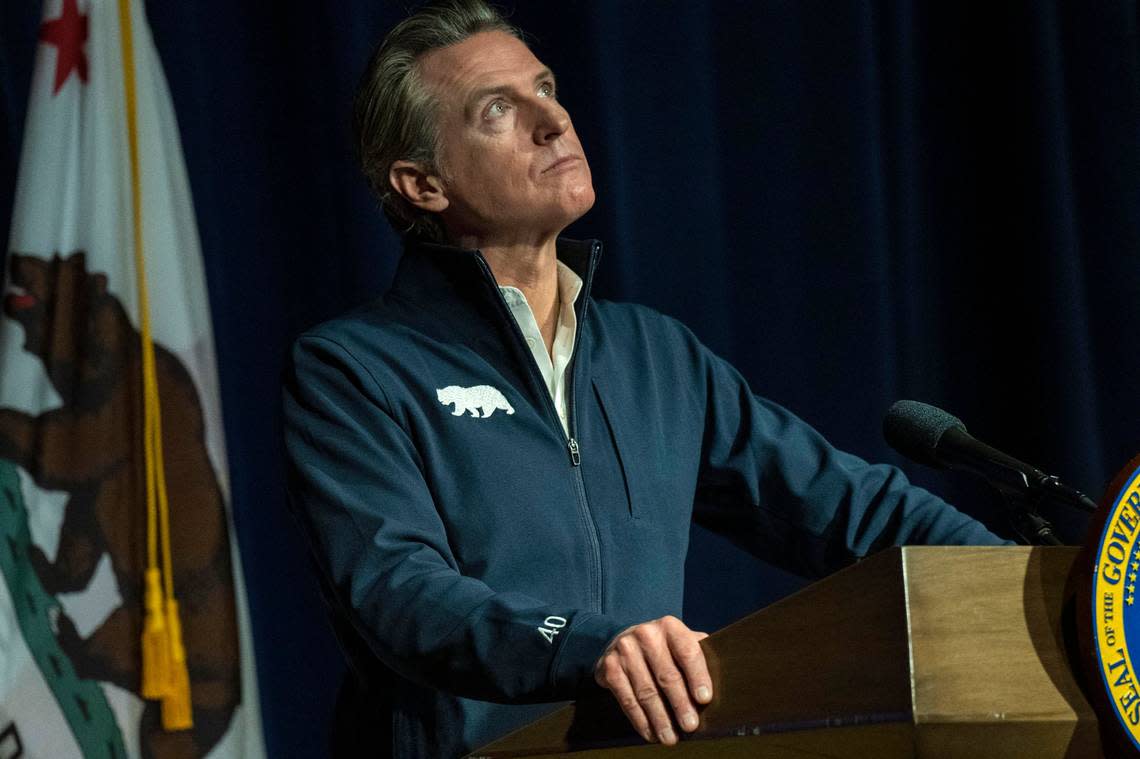Joe Biden faltered in the debate. How will Gavin Newsom address calls to replace him?

- Oops!Something went wrong.Please try again later.
- Oops!Something went wrong.Please try again later.
- Oops!Something went wrong.Please try again later.
As Democrats scramble in the aftermath of President Joe Biden’s poor performance against rival Donald Trump during the first presidential debate of the 2024 general election, the spotlight on California Gov. Gavin Newsom brightened.
It puts Newsom, an official Biden surrogate and likely 2028 presidential candidate, in a tough spot.
“It’s not going to be comfortable for him. He’s going to continue to say what he said (Thursday night), which is ‘I support Joe Biden, he’s a good president, etc.,’” said Sherry Bebitch Jeffe, a senior fellow at the Sol Price School of Public Policy at the University of Southern California.
That’s exactly what Newsom did Friday. He continued to play a loyal surrogate, fundraising and posting messages on social media defending Biden’s record.
In a fundraising email to supporters Friday morning, Newsom insisted “on the substance Joe Biden won the debate last night. That is what matters to me.”
The second-term governor also attempted to bat away rumors – and outright pleas from some on social media – that he might replace Biden or become the Vice Presidential candidate if Kamala Harris is elevated to the top of the Democratic ticket.
A YouGov poll surveyed more than 2,600 U.S. adults after the debate and found 49% of them think the Democratic Party should nominate somoene other than Biden. Thirty percent said Biden should be the nominee and 22% said they were unsure.
Other Democrats including Michigan Gov. Gretchen Whitmer and Illinois Gov. JB Pritzker are being named as potential replacements.
“All this other talk... it’s unhelpful and unnecessary,” Newsom’s email continued. “We aren’t going to turn our backs because of one performance. What kind of party does that?”
The email went on to defend Biden’s record on the economy, gun safety, lowering the cost of prescription drugs and passing a $1.2 trillion infrastructure package before asking supporters to donate to the Democratic National Committee.
In a message posted on X, Newsom said the email raised over $200,000 for the DNC in a little over an hour.
Bebitch Jeffe said Newsom stuck to his duties as a surrogate by defending Biden and attempting to focus attention back on Trump after the debate. But it didn’t stop reporters in the “spin room” from swarming the governor to ask if he would consider jumping in.
Biden’s campaign had hoped to use the debate to fend off concerns about the president’s mental acuity but the strategy backfired. Newsom, meanwhile, presented himself as an energetic defender of Biden and the Democratic platform.
“If you call central casting and ask for somebody to play the President of the United States, you might get Gavin Newsom,” Bebitch Jeffe said.
But as a surrogate committed to publicly backing the president, Newsom could never “look like he is actively campaigning to replace Joe Biden on the ticket,” she said. “And I don’t think he will.”
Democrats have an uncomplicated way to replace Biden. Its nominating delegates, chosen in primaries and caucuses this year, are technically not bound to Biden or anyone else (they’re pledged but not obligated).
“All delegates to the National Convention pledged to a presidential candidate shall in all good conscience reflect the sentiments of those who elected them,” says p. 21 of the party’s convention rule book.
So they could vote for anyone, and it would take a majority of the delegates to choose a new nominee.
At the moment, virtually all of the delegates are pledged to Biden. Without Biden in the race, Vice President Kamala Harris would be the favorite. If Newsom or anyone else wanted to challenge her they could face multiple convention ballots.
That could get complicated, since party officials would be given a bigger role in multiple ballots. The last time a major party convention went beyond a first ballot was in 1952, when Democrats needed three ballots to nominate Adlai Stevenson–who wasn’t even a candidate until the convention began.
David Lightman contributed reporting.

